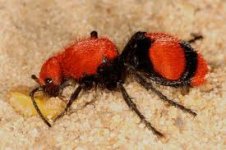Davers
Gold Member
- Jan 8, 2013
- 8,166
- 7,199
- Detector(s) used
- Whites Spc xlt & Tesoro Tejon- Now back ...Fisher 1266-X. TRX Pointer. New .Teknetics G2 + . New AT Pro .
- Primary Interest:
- All Treasure Hunting
What's eating the yellow Jackets nests
I have heard in the past few years about the Honey Bee's issues with evasive species & disease but in the last few years 2 mainly Ive come across only 2 active in ground Yellow Jacket nests 1 was normal bee's coming and going every second or so & the other only barley active 1 bee every 10-15 seconds the approx, 10-15 others were dug out by something [usually with a destroyed cone nearby] What is doing this as Im used to getting stung around 5-10 times a year but have not been stung in 3 [ that is a good thing] I'm about 20 miles north of Atl GA just for a ref, point. Any Info,?
I have heard in the past few years about the Honey Bee's issues with evasive species & disease but in the last few years 2 mainly Ive come across only 2 active in ground Yellow Jacket nests 1 was normal bee's coming and going every second or so & the other only barley active 1 bee every 10-15 seconds the approx, 10-15 others were dug out by something [usually with a destroyed cone nearby] What is doing this as Im used to getting stung around 5-10 times a year but have not been stung in 3 [ that is a good thing] I'm about 20 miles north of Atl GA just for a ref, point. Any Info,?








